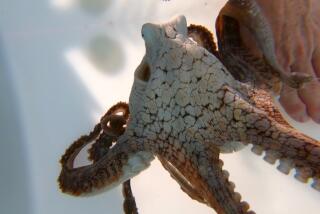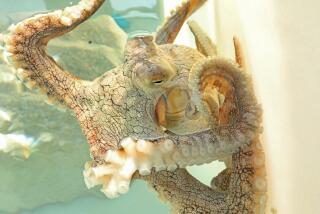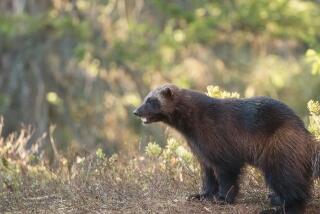Ownership of big cats should be restricted, lawmakers say
WASHINGTON--The scare caused by the release of dozens of exotic animals from an Ohio backyard menagerie last year is spurring a drive in Washington to put restrictions on the private possession of dangerous big cats.
The measure would require anyone who possesses big cats, such as lions, tigers, cougars, leopards and cheetahs, to register with federal authorities to keep the animals they own. It would outlaw the breeding of any big cat except at accredited zoos and research and educational institutions.
âHow many incidents must we catalog before we take action to crack down on private ownership of dangerous exotic animals?ââ Reps. Howard âBuckâ McKeon (R-Santa Clarita) and Loretta Sanchez (D-Garden Grove), sponsors of the Big Cats and Public Safety Protection Act, said in a letter to colleagues seeking their support.
âNot only is it dangerous for humans to house these animals, but itâs dangerous for these animals too,ââ they said.
Violators of the law could have their animals confiscated and face up of to $20,000 in fines and up to five years in prison. Sen. John Kerry (D-Mass.) plans to introduce a similar bill in the Senate, a spokeswoman for the lawmaker said.
The measure comes after Terry Thompson in October released 56 animals, including lions and rare Bengal tigers, from his Zanesville farm, then committed suicide. Authorities killed 48 of the animals; some of the animals are believed to have been eaten by other escaped animals. State officials this week said they will return five surviving animals, two leopards, two primates and a bear, to Thompsonâs widow.
Bills to restrict private possession of exotic animals have been introduced in at least a dozen states, according to the Humane Society of the United States.
But Ralph Henry, an attorney with the Humane Society of the United States, told The Times that federal legislation is needed to address a patchwork of state laws.
âThe private possession and breeding of big cats simply exacerbates welfare and public safety problemsâas we saw with the incident in Zanesville, Ohio, last yearâand does not nothing to contribute to global conservation efforts for the species,ââ he said.
There are an estimated 10,000 to 20,000 big cats in private ownership, according to the International Fund for Animal Welfare.
McKeon sponsored the 2003 Captive Wildlife Safety Act, banning the interstate sale of big cats for pets and signed into law by President George W. Bush in 2003. His district includes an Acton, Calif., wildlife sanctuary operated by actress Tippi Hedren.
The bill has been referred to the House Natural Resources Committee for consideration.
ALSO:Seattleâs May Day protests wane in chilly evening rain
Exotic animals to be returned to widow in Zanesville, OhioSurvivalistâs bunker: Trail of clues led to Peter Keller hideout
More to Read
Sign up for Essential California
The most important California stories and recommendations in your inbox every morning.
You may occasionally receive promotional content from the Los Angeles Times.











